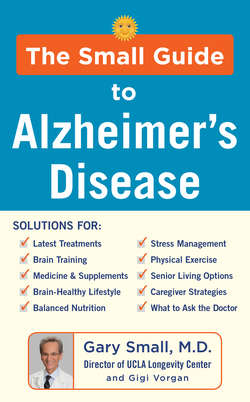Читать книгу The Small Guide to Alzheimer's Disease - Gary Small - Страница 14
На сайте Литреса книга снята с продажи.
Navigating Denial
ОглавлениеWhen I first consult with families about a patient’s cognitive decline, typically the spouse, siblings, or adult children try to pull me aside in the hallway to talk alone about their fears and concerns. To avoid the awkwardness of these hallway sidebars, I make a point of meeting separately with patients and family members so I can address each of their concerns and offer guidance as to how to engage in these often delicate conversations with their loved one.
Recently, my friend Steve called to talk about his 80-year-old father, Harry, who had been living alone in New Jersey since his wife died six years earlier. Because Steve was busy with his job and family life in Los Angeles, he rarely had time to go back and visit his dad. When his sister Jane called to say that Harry got lost on his walk for the third time, Steve wasn’t sure what to do, so he gave me a call.
“I need to get more information, Steve. Does your father have a doctor in New Jersey?”
“Yeah, sure, Gary, but he refuses to go and insists there’s nothing wrong with him.”
“So I guess he wouldn’t see a psychiatrist who I know back there . . .”
“No way. But I’m flying him out here next month for the holidays.”
“Maybe you can get your dad to come see me—he already knows me. Maybe I can help figure out what’s going on and what the next steps might be.”
When Steve picked his father up at the airport, Harry seemed surprised to see him.
“What are you doing here, Steve? Where’s Jane?”
“She’s home in New Jersey, Dad. You’re in Los Angeles. You came to visit me for the holidays.”
“I know that—I’m not an idiot!”
“Okay, it’s okay. Let’s get the car.”
Steve called me later. His father was much worse than he’d anticipated. Not only was Harry forgetful; he was ornery and obstinate. There was no chance in hell that Steve was going to get Harry to my office as planned. I had another idea—my wife and I could stop by the house, and I could try to do a casual assessment without Harry even knowing it.
Steve opened the front door and seemed relieved to see us. We went into the den where Harry was watching football.
“The Smalls are here, Dad. You remember them, right?”
Harry looked at us with a total lack of recognition. “Right. How ya doing?”
“Fine. Good to see you.” I sat down on the couch and asked, “Who’s winning?”
“Winning?”
“The football game?”
“Oh.”
I suspected that Harry didn’t know who was playing, let alone who was winning.
We sat and chatted during the game. I could see that Harry was having trouble following the conversation, but like so many other patients in the early stages of cognitive impairment, Harry was still pretty good at faking it. He nodded, cheered, and laughed when everyone else was doing it, but I could see he didn’t really get the jokes or engage in the conversation.
After the game, we moved to the dining room for dinner, and I sat next to Steve’s dad.
“So, Harry, how long are you staying for this trip?”
“Don’t know, but it’s great having the kids home again.”
As we ate our salads, I noted that Harry was having trouble staying oriented and tracking the conversation.
When dinner was served, Harry turned to Steve and said, “Remember when I caught you dressed up in your sister’s clothes? You should have seen your face!”
“I was five, Dad.”
Harry reached over, grabbed an asparagus spear off my plate, and took a bite. “This is so good.”
The more time I spent with Harry, the more convinced I became that he was suffering from a significant cognitive impairment. He could still recall details from years ago, but his memory for recent events was definitely off. In fact, Harry’s short-term memory was so bad that it was hard to believe he still lived on his own. Although his symptoms pointed to Alzheimer’s dementia, I didn’t have enough information to confirm that diagnosis.
I was also concerned about Harry’s deteriorating social skills. Eating food off my plate and embarrassing Steve with inappropriate comments suggested a problem in his frontal lobe—the part of the brain that controls judgment and social graces. This kind of behavior can indicate the early stages of frontotemporal dementia, which can often be mistaken for Alzheimer’s but has a different brain effect and responds differently to medicines. At the end of the evening, I was convinced that we needed to get Harry in for a brain scan to help pinpoint his diagnosis and get him started on the right treatment.
Unfortunately, getting Harry in for a scan was not the only problem. Steve was having a hard time processing the idea that his father was truly declining mentally. Like many of my patients’ family members, Steve was a smart guy who wanted the best for his father, but he hadn’t really expected to hear how serious Harry’s cognitive decline had become. He was upset, and I can certainly understand that. When my own mother began to forget things and repeat herself over and over, intellectually I knew what was happening, but emotionally I wanted to ignore it. The fact is that denial is a common emotional stage that most people experience when coming to terms with the reality that a loved one may be losing their mental abilities.
